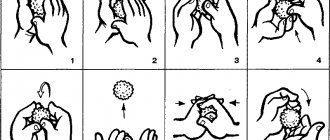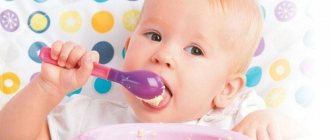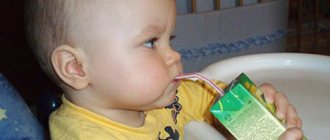At what age should a child eat on his own?
At what age a child learns to feed himself with a spoon depends on the parents.
All children are different: some at six months are already reaching for a spoon and trying to hold it in their still weak fist, while others, even at 2 years old, do not want to eat with a spoon themselves. Some children only begin to eat on their own by the age of 3-4 years. But! You shouldn’t let everything take its course and give up at the first failures. The more you care for your baby, the later he will show his independence and the slower he will learn new things.
Take it for granted that when your baby is just learning to feed himself, soiled clothes and food scattered all over the kitchen are normal. Exhale - and try not to get nervous. You may have to clean up and wash the “pig” after every lunch. Be patient and everything will work out!
razvitie-krohi.ru
As a rule, by the age of 1.5 years, a child can already use a spoon independently. But for this, from the age of 7-8 months, you need to allow him to look at cutlery, play with them, try to scoop something up, etc. Of course, mom will feed him faster, but you want to enjoy the success of your little one and the manifestations of his independence as early as possible, is not it.
How to teach a child to eat independently
It can be difficult for a child to learn to use a spoon, and this process also requires attention and patience from adults. How to teach a baby to eat on his own, what kind of food pieces should he eat, and is utensils needed at six months? Nutritionist Anastasia Ivanovna Shalunova gives useful advice.
— Anastasia Ivanovna, at what age are children taught to feed themselves?
“This is a very important topic for both parents and doctors. Children begin to feed themselves at different ages. But you can teach them to hold utensils and use plates from the very beginning of complementary feeding.
Pediatricians recommend trying to encourage your child to eat on his own from 6-7 months. At this point the child should:
- confidently take and hold a spoon in your hand;
- sitting without support;
- There are complementary foods for three to four weeks.
The child must understand why he needs to sit at the table and why he is given cutlery - then it will be easier for him to learn independence.
A child can learn the skill of eating independently without parents, but he still needs help. Personal or collective example works best. In contrast, we can recall the stories of “Mowgli” children, whom no one teaches social skills, which gives a corresponding sad result.
— What to do if parents missed the start of training? How to teach a child to eat with a spoon?
- Be patient. According to reviews from mothers of small children, maximum socialization helps a lot with this - for example, staying in kindergarten. In a group, kids repeat actions one after another and get involved in the process. If a child cannot go to kindergarten, then it is important to visit more public places so that he can see how other children eat.
You can learn while playing and listening to cartoons, but the main thing is not to get too carried away
|
|
— At what age can you give your child food in pieces?
— The texture of the product is of great importance during the baby’s introduction to solid food and the first steps towards eating independently. He learns to chew and swallow gradually, moving from semi-liquid foods to dense and solid ones.
- At 3-4 months, some choose pedagogical complementary feeding with the goal not to feed, but to give the child a taste of the product. And here the pieces will be the size of a match head.
- At 4-6 months, the first real complementary foods are introduced - these are homogeneous cereals or purees.
- At 6-7 months, soft pieces the size of a little fingernail are given so that the child does not choke.
Doctors note that solid adult food helps all structures of a child’s body form correctly. It is especially important in the development of the brain, teeth and bite.
— Is it necessary to heat treat vegetables and fruits or can they be given to the child raw?
— It is better to heat-treat the fruits, but you need to take into account the type of vegetables and fruits, as well as whether you are giving the product from the store or grown on your own plot. In any case, it is advisable for the mother to be attentive to the baby and, ideally, keep a food diary, tracking the child’s behavior, the reaction of his body, changes in stool, and so on.
— How is a child’s ability to eat without the help of his mother related to his development and health?
- By about seven months, the palmar type of grip is formed: the child can grasp and hold small objects with his hands. From now on, he can be offered to try fruit slices or cookies. But it is not advisable to give them before this age.
They are taught to actively feed independently from 6 to 10-12 months. If you miss time, it will be problematic to further introduce solid food into your diet.
What does the lack of chewing ability lead to:
- the child will begin to choke on food, spit out the food lump, refuse to chew and swallow the offered product;
- You may develop a tendency toward liquid nutrition and excessive pickiness in food;
- Digestion and development of speech skills are impaired.
- How not to choke? Are there any feeding rules?
— A small child is more likely to choke on food and small objects from toys. Even children at the breast can choke on milk due to the individual characteristics of the body of the baby and the mother. To avoid unpleasant situations when regurgitating, after feeding, the baby should be held vertically in your arms until he burps.
The main mistake parents make is they are in a hurry. They begin to teach the child to eat on his own early or give him a large portion, large pieces of food. An unprepared baby simply will not understand what to do with a spoon, plate, or food. You can learn to hold a spoon or take food with your hands, bring food to your mouth and chew it fully only gradually and slowly.
— If a child does choke, how can I help him?
— It is important to prepare for such moments and watch training videos in advance.
First aid for a choking baby
| Can't cough everything up |
|
| Severe cough, but normal breathing |
|
| The condition is worsening - urgently contact doctors by calling “112” |
|
— When helping a choking child, parents need to remember that any cough is always more effective than physical manipulation of the body. And if a child tries to clear his throat, there is no need to interfere, the body will cope on its own.
If a child chokes on something hard, do not try to pinch and pull out the foreign body with your fingers or tweezers. It can penetrate even deeper and scratch the delicate mucous membranes of the baby’s mouth and respiratory system.
Critical situations that require immediate assistance:
- the child cannot breathe on his own;
- the baby's eyes are wide open;
- the child is frightened, wraps his hands around his throat;
- wheezing is heard;
- increased salivation, mouth opens wide;
- the baby turns red, then begins to turn blue, and loses consciousness.
— Do I need to buy my child’s own dishes and other accessories for eating?
— It is better to start eating from dishes from six to seven months. If baby teeth begin to erupt early, then from four to five months you can use a nibbler.
Personal children's dishes, regardless of shape and size, a personal and permanent place at the table, a certain feeding time - all this accustoms the child to independent feeding.
They begin to introduce the baby to plates and spoons from four to five months. First of all, the mother can play with the child and pretend to cook porridge in a saucepan, put it on a plate and give it a spoon.
Utensils for feeding a baby should be light and safe. Color and shape are selected individually. But the pictures on the plate can become a substitute for cartoons if you look at them or come up with stories. For example, “Eat porridge or soup and see what’s hidden at the bottom of the plate” or “Let’s save the hero.” The main thing is not to play too much at this moment so that the child eats.
— If a child does not want to eat from a spoon, what teaching principles will help parents?
— If a child refuses cutlery, try other options or select a different consistency of food. I'll tell you a case from personal experience.
The youngest daughter is 3.5 years old, and she loves to get into the plate with her hands, especially into soup, although she is good with spoons and knows how to use forks and knives too. Perhaps she solves some tactile problems in this way, and we do not punish her for this, but we try, for example, not to order soups in a cafe. It is important to remember that by personal example it is easier to teach a child to eat with a spoon, and there are psychological aspects for which you cannot scold and which at the same time cannot be called deviations.
- That is, the baby may have his own good reason for refusing to eat dishes.
— Often, a child refuses to eat if he is not interested in it, he does not like the color of the dishes or the shape of the spoon, or the fact that his mother persistently puts the spoon in his mouth, hurries him. Associations with food should be positive. It is very important for a child to eat with his family, so it is advisable for everyone to gather together at the table as often as possible: this way the baby will receive a role model. Socialization will do its job, and the child will get used to the fact that everything is eaten with spoons and forks, cereals and soups are served in deep plates, and vegetables, cereals and pasta are served on flat ones.
Another interesting problem is how to teach a child to drink from a cup. Parents use a trick and give their baby drinks from cups with a spout or sippy cups with silicone tubes. But all this helps temporarily. When a child already knows how to hold something in his hands and coordinate his movements, you need to more often give him an ordinary kitchen mug or cup that he can hold, including liquid of a certain volume. For example, if your child quickly gets used to a half-filled mug, do not fill it to the brim. You always need to take into account two points - children's interest in dishes and the desire of adults to help in the formation of a new skill.
The most optimal age for a child to learn to eat independently is from six to twelve months. Moms and dads should be on hand and help so that the baby understands what he is doing. Food should become an opportunity to satisfy hunger, part of the daily routine, an exciting and safe process - this is as pleasant as possible for the child and useful for developing the skill of independent feeding.
member of the Russian Union of Nutritionists, Dietitians and Food Industry Specialists (RoSNDP), @wellnutrition.family
Shalunova Anastasia Ivanovna
*The ideal food for an infant is mother's milk. WHO recommends exclusive breastfeeding for the first 6 months. MAMAKO® supports this recommendation. Before introducing new foods into your baby’s diet, consult a specialist.
Was this article helpful? Share it on social networks!
How to choose a baby spoon
Does your baby need his own dishes? Definitely needed! Under no circumstances should adults eat from a baby spoon, lick it, etc.
irecommend.ru
The baby will need a spoon from birth, so take its choice seriously. Pay attention to trusted manufacturers and high-quality food-grade plastic.
It is better to give water or medicine from a spoon so that there is no “nipple confusion”. Then the baby will want to chew on the spoon and study it. Keep it clean at all times. If defects, cracks, or chips appear, replace them. the baby may get hurt.
agushkin.ru
- A metal (grandmother will definitely find the one “from which you were fed”) and even a silver spoon (a gift from the godmother, how could you live without it) are not the best option for a baby. Leave these spoons for older children.
- Silicone spoons are proportional to a child's mouth and do not injure the mucous membrane and first teeth.
- Children's cutlery with a curved handle is convenient.
- Spoons with rubberized handles are good; they do not slip out of an inept palm.
Tips for moms: how to teach your child to eat independently
The best way to teach is to get out of the way!
- Use a special high chair. Move it closer to the table: the child feels equal to everyone else, and you feel comfortable.
tvoymalysh.com.ua
- Cover the table and the floor under it, put on a bib for your baby, and prepare napkins if you need to wipe anything.
You can make “workwear” from your dad’s old shirt: it’s convenient to put it on backwards and forwards and fasten it at the back. Another life hack is a pillowcase with holes cut out for the head and arms.
If the apartment is warm, you can leave a minimum of clothes on the child - you will have to wash less.
- Check the temperature of the food so that the child does not get burned or scared.
- Everything should be beautiful! Use bright dishes with pictures and interesting designs for children's dishes.
- Prepare two spoons (preferably the same ones): one for the child, the other for yourself.
Let the child begin to eat on his own, and when he gets tired, help him without taking the spoon from his hands. If your baby is unable to put food into a spoon on his own, you can offer him a spoon already filled with food.
There are situations when you are in a hurry or it seems to you that the child will eat poorly or little on his own. You shouldn’t take the spoon away from him in order to quickly feed him properly. Haste in this matter is not welcome.
- Try to cut food into small pieces.
The child will be able to take food himself. Don't scold him if he starts eating with his hands.
- Prepare dishes that stick well to a spoon: jelly, mashed potatoes, porridge, cottage cheese, etc.
- Use unbreakable utensils.
- Buy a children's plate with suction cups or a rubberized bottom, then the baby will not move it around the table and turn it over.
- When playing with your child, use the theme of food. For example, “Dinner Party at the Toys”, games in the sandbox with a shovel, etc.
What to do if the child does not want to eat on his own?
- Don't force feed your baby! Otherwise, he will hate food as a process, and it will be difficult for you to teach him to eat on his own in the future.
- Postpone training for a few days if the baby is sick or simply not in the mood, let him rest.
- Do not combine feeding with games, reading, or watching cartoons. Otherwise, the baby will get used to it, and this is harmful for digestion, because... saliva is secreted in smaller quantities, which means food is poorly digested.
- While feeding your baby, ask other family members to also be present at the table and actively eat with spoons.
When the baby sees that his brother eats with a spoon himself, he may also want to try.
- Invite other children who already know how to feed themselves. Have a lunch together.
- Don’t let your child watch cartoons, play around and be distracted during lunch; focus on the main thing - teaching your child to eat with a spoon on his own.
- Don't rush your child.
- If you start teaching your child to eat on his own, don’t back down. Warn other family members that from now on the baby eats on his own and does not need help. Don't do for your child what he can do for himself!
- If at some point the baby refuses to take a spoon, do not insist, do not force.
- Do not use large portions. It’s better to let the baby ask for more when he eats everything himself.
Kuznetsova-mother
Kuznetsova-mother ! Do not pay attention to the accusations of those who have not been in the exact same situation as yours. And many of the tips (of course with the best intentions) are given here without taking into account one of the most important points - your child’s increased gag reflex. And this is the main reason that he does not want to eat himself with a spoon - not the mother’s omission or inaction, not the child’s laziness or inability, but his fear of food for fear of choking and vomiting. There are such children, and mothers are not at all to blame for this, but doctors blame it on anything due to illiteracy.
My child and I have the exact same situation as you, and we have behind us a huge number of serious examinations, doctors, information studied on this topic and the experience of our own and others and the kindergarten. The child is completely healthy and well developed mentally and physically, BUT! The child has reactive vomiting of a neurogenic nature as a reaction to fear (from any fear, fear of lumps in food, unfamiliar taste of new food). As it turned out, this is associated with damage to certain responsible areas of the brain due to asphyxia during childbirth (entanglement of the umbilical cord, long attempts, squeezing out a child) or as a consequence of vaccinations, or infections and toxic substances during pregnancy. Such children have problems with feeding almost from birth (sluggish sucking reflex, refusal of bottle nipples, etc.).
In no case can this problem be solved by starvation, because such children “do not experience hunger.” This is fraught with acetone syndrome in the child, which will have to be eliminated in intensive care. When a child is fasting, acetone increases in the blood, which leads not to an increase, but to an even greater lack of appetite and to an even greater increase in acetone, and then possibly to a coma from dehydration due to continuous vomiting.
In your situation, it is unlikely that you will be able to solve the problem quickly and radically. Often, and from my own experience, I will say that until the child “outgrows” this, nothing will work. After all, all children are very individual and in kindergartens the conditions are also different and a lot depends on the staff. In our kindergarten there has been almost no progress in a year (the child is already 4 years old) - he doesn’t want to eat there (the food is delicious). But in general, we still make slow progress with age - even though he has been able to eat with a spoon since he was 2 years old, the fear of pieces, lumps in food and the reluctance to eat himself or something solid has only recently begun to go away.
You can only help the child and try to speed up the process with your gentle perseverance, attention and patience so that in small steps you gradually move towards the goal.











